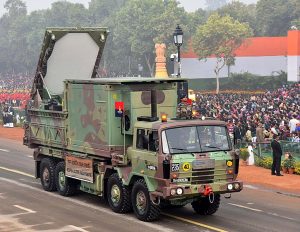By Shishir Upadhyaya
 In a major success for India’s defense sector, India reportedly outbid Russia and Poland to win a $40 million defense deal to supply four indigenously-built military radars to Armenia. These radars, known as SWATHI, were developed by India’s Defense Research and Development Organization (DRDO) and manufactured by Bharat Electronics Limited (BEL).
In a major success for India’s defense sector, India reportedly outbid Russia and Poland to win a $40 million defense deal to supply four indigenously-built military radars to Armenia. These radars, known as SWATHI, were developed by India’s Defense Research and Development Organization (DRDO) and manufactured by Bharat Electronics Limited (BEL).
Indeed, this deal is a major achievement for the “Make in India” program in the defense sector as it could open new opportunities in Europe for the sale of India’s indigenous systems, at lower costs than equivalent European systems. It could also help the Indian defense industry to make inroads into markets in Southeast Asia, Latin America, and the Middle East. But this deal has other strategic implications. It is clearly aimed at countering increasing hostility from Turkey under President Recep Tayyip Erdogan toward India.
In September 2019, speaking at the 74th session of the UN General Assembly, Erdogan – who has aspirations to position himself as a strong leader in the Muslim world – raised the issue of Kashmir at the behest of Pakistan. The residents of Jammu and Kashmir have been kept “virtually under blockade,” Erdogan, told the UN General Assembly, referring to the measures taken by New Delhi to maintain law and order in Kashmir following the revocation of Article 370. Erdogan also stated that the Kashmir issue has awaited a solution for 72 years and that a solution can only be found through dialogue between India and Pakistan — a position that India has strongly rejected, maintaining that Kashmir is an integral part of India.
Since then, New Delhi has not pulled any punches on Turkey. An immediate fallout of Erdogan’s speech was that Prime Minister Narendra Modi met – on the sidelines of the UN Summit itself – with the heads of Ankara’s archrivals, including neighboring Greece, Cyprus, and Armenia, all of whom have an ax to grind with Turkey. Particularly, Armenia is still locked in acrimony with Turkey over the 1915 genocide (a term Ankara strongly rejects), which saw the killing of over a million Armenian Christians in the Ottoman Empire, the predecessor of modern Turkey. Next, New Delhi cancelled Modi’s planned visit to Turkey and a lucrative $2.32 billion naval deal with Turkish defense company Anadolu Shipyard for five 45,000 ton fleet support ships for India, followed by a reduction in imports from Turkey. Pertinently, Pakistan awarded fresh naval ship contracts to Turkey to offset their loss. India also condemned Turkey’s military offensive against the Kurds and urged the Erdogan government to respect Syria’s sovereignty and territorial integrity.
Undeterred by New Delhi’s response, Erdogan has continued with his tirade against India. During his February visit to Islamabad, he reiterated his country’s support for Pakistan on Kashmir, telling a joint session of Pakistan’s parliament that India’s decision to revoke the erstwhile state’s special status had “exacerbated the troubles of our Kashmiri brothers and sisters.”
New Delhi’s response to Turkey has been evenly matched. And in a classical realpolitik move, as advocated by ancient Indian strategist Chanakya (regarded by some as the Indian Machiavelli) New Delhi has stepped up relations with Armenia. An enemy’s enemy is your friend, as the logic goes.
Thus, while Erdogan was cozying up with Imran Khan in Pakistan, the Indian and Armenian foreign ministers held a one-on-one dialogue in the United States. A joint statement read, “Armenian-Indian relations have gained a new quality,” stressing on “the importance of preserving the dynamics of bilateral political dialogue.”
The latest defense deal between Armenia and India is step toward deepening strategic ties with Turkey’s adversarial neighbors. Similar deals with Greece and Cyprus could follow in a bid to force Ankara to reconsider its opposition to India.
Shishir Upadhyaya is a former Indian naval intelligence officer and an international relations and security studies analyst.
No comments:
Post a Comment